|
|
|
Sort Order |
|
|
|
Items / Page
|
|
|
|
|
|
|
| Srl | Item |
| 1 |
ID:
123888
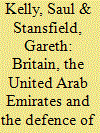

|
|
|
|
|
| Publication |
2013.
|
| Summary/Abstract |
This article investigates the deepening of the UK's security and defence arrangements with the United Arab Emirates (UAE).
In recent years there has been a flurry of diplomatic activity indicating far closer engagement between London and Abu Dhabi. Rather than being an innovative initiative of the Cameron government, the interaction has deeper roots, with this article uncovering the importance of the relatively unknown Defence Cooperation Agreement (DCA) of 1996, signed by the Major government. Furthermore, the UK-UAE defence relationship is shown to have endured beyond the infamous UK withdrawal from 'east of Suez' in 1971.
The current engagement is, however, more intense and potentially far-reaching than it had been in recent decades, with the defence sector being placed at the forefront of UK efforts to bolster the relationship with the oil-rich Gulf emirate.
Using official statements from London and Abu Dhabi, this article suggests that the UK-UAE relationship has always remained intact, although it lost focus following the end of the Major government until the refocusing on the Gulf by the Cameron government. The article concludes with an assessment of the expectations of the UAE, and the strategic drivers underpinning UK policy.
|
|
|
|
|
|
|
|
|
|
|
|
|
|
|
|
| 2 |
ID:
123882
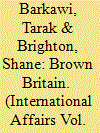

|
|
|
|
|
| Publication |
2013.
|
| Summary/Abstract |
How do we approach the subject of British grand strategy today? This article seeks a new approach to this question. It argues that there is a gap of grand strategic significance between actually-existing Britain and the Britain its political elites tend to imagine.
The colonial and imperial histories that helped constitute and still shape the contemporary United Kingdom have fallen through this gap. One consequence is a grand strategic vision limited to a choice of partner in decline - Europe or the US. Overlooked are the power political potentialities of post-colonial generations situated in multiple sites at home and abroad.
In search of this potential, we lay the conceptual basis for a strategic project in which the British 'island subject' is replaced by a globally networked community of fate: 'Brown Britain'. This entails reimagining the referent object of British strategy through diaspora economies, diverse histories and pluralized systems of agency.
What might such a post-colonial strategy entail for British policy? We offer initial thoughts and reflect on the often occluded social and political theoretic content of strategic thought.
|
|
|
|
|
|
|
|
|
|
|
|
|
|
|
|
| 3 |
ID:
123890
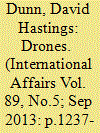

|
|
|
|
|
| Publication |
2013.
|
| Summary/Abstract |
The Obama administration's controversial use of drones in Afghanistan, Pakistan and Yemen has made the subject a hot topic of political and academic discourse. While most of this debate has focused so far on the legal, ethical and prudential use of large armed aerial vehicles, this article seeks to address the potential wider impact of this new technological innovation.
The article argues that drones constitute a new and disruptive technology not just in the way that they have been used to enable a new form of counterterrorism. Instead, it argues that drones pose a new form of terrorist threat against the West which is at present under-analysed, unarticulated and underestimated.
Part of the reason for this underestimation is the failure to appreciate the scale and scope of drone use for commercial purposes which is about to unfold. Technological innovation now means that drones will be capable of many jobs currently performed by small planes and helicopters, but more cheaply and easily - in addition to many other new applications.
The proliferation of this cheap and easily available technology will make its application for terrorist use easy to achieve and difficult to counter. The ability of drones to penetrate traditional defences and established conceptions of what constitutes a plausible threat is a challenge which so far has gone unheeded. This article seeks to challenge that complacency.
|
|
|
|
|
|
|
|
|
|
|
|
|
|
|
|
| 4 |
ID:
123885
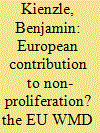

|
|
|
|
|
| Publication |
2013.
|
| Summary/Abstract |
In the aftermath of the ruptures caused by the Iraq crisis, European states agreed in December 2003 on both a European Security Strategy and an EU Strategy against the Proliferation of Weapons of Mass Destruction (WMD).
Ten years have passed since this attempt to kick-start common European policies on WMD proliferation. How well have EU policies performed in this area? Has a specifically European way of dealing with proliferation challenges emerged?
This article traces the development of EU policies on WMD proliferation since 2003 by examining, in particular, European reactions to the nuclear crisis in Iran, as well as European interactions with the international non-proliferation regime and the cooperation with partner countries. The article concludes that the EU has performed much better than might have been expected in an area that has traditionally been one of the fiercely guarded prerogatives of national security policies.
The EU's good performance is very much related to institutional flexibility, as exemplified by the EU/E3 approach to Iran, and to a high degree of political pragmatism. However, important shortcomings remain, most notably the lack of coordination between national and European non-proliferation efforts. In other words, the EU has not in the last 10 years turned into a fully fledged non-proliferation actor that can deliver tangible results in any area of proliferation concern.
|
|
|
|
|
|
|
|
|
|
|
|
|
|
|
|
| 5 |
ID:
123887


|
|
|
|
|
| Publication |
2013.
|
| Summary/Abstract |
The next Strategic Defence and Security Review (SDSR) will be held in 2015. With unfinished business from its 2010 predecessor, and with no sign that UK national strategy is about to escape the grip of austerity, the 2015 SDSR is set to be more complex and contentious than the government might have hoped.
There is a possibility that the review will, yet again, see the three armed services struggle against each other to secure the largest slice of a diminishing cake. The review might also be captured by a fruitless discussion of 'grand strategy'. SDSR 2015 must avoid both of these distractions.
There are four principal concerns arising from SDSR 2010: the feasibility of the Future Force 2020 plan, various capability gaps that must be managed, inconsistencies in the national strategic planning framework, and unresolved concerns about the relationship between society, armed forces and government in the UK.
In response to these concerns, the authors argue for a risk-sharing approach to the SDSR, embracing the widest conceivable range of stakeholders in national strategy: the armed services, government departments and agencies, industry, civil society, and allies and partners.
In UK military circles, inter-service cooperation is known as 'jointery' and is denoted by a certain shade of purple. The effect of austerity is to constrain national strategy, just as the international security environment makes ever more demands upon it. In these circumstances, strategic options must be generated by joint collaboration, denoted by as many shades of purple as appropriate.
|
|
|
|
|
|
|
|
|
|
|
|
|
|
|
|
| 6 |
ID:
123892
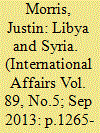

|
|
|
|
|
| Publication |
2013.
|
| Summary/Abstract |
This article examines recent UN Security Council deliberations over events in Libya and Syria and in particular assesses the extent to which Council members sought to justify their positions and voting behaviour by reference to the 'Responsibility to Protect' (R2P).
It shows how limited invocations of R2P were with regard to Libya, before proceeding to demonstrate how, somewhat paradoxically, R2P-sceptics such as Russia and China subsequently drew upon concerns over the manner in which NATO implemented its UN-mandate in Libya to cast doubts over R2P during debates over Syria.
Contemplating the implications of the Libyan and Syrian cases for the future of R2P, the article concludes by arguing that the concept's international standing can best be preserved through the excision of its most coercive elements; R2P should be reconstituted as a standard of acceptable sovereign behaviour and a mechanism geared towards the provision of international guidance and support, while decisions over coercive military intervention, inevitably infused with considerations of strategic interest, should be made outside the R2P framework.
|
|
|
|
|
|
|
|
|
|
|
|
|
|
|
|
| 7 |
ID:
123883
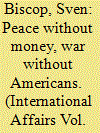

|
|
|
|
|
| Publication |
2013.
|
| Summary/Abstract |
Just as the shift of the American strategic focus to Asia and the Pacific forces strategic autonomy upon Europeans, the financial crisis limits their means. In the age of austerity, dispersed efforts and spending on secondary issues have become unaffordable. Prioritizing and making strategic choices have become more important than ever.
As no single European state can face all these challenges alone, a joint European strategy must assess where collective foreign and security policies can bring the most added value to the national effort. Through the European Union, Europeans have attempted as much in the 2003 European Security Strategy, but for lack of prioritization, the EU has so far underperformed. Yet the EU does have access to substantial means and possesses all the necessary instruments to pursue a comprehensive strategy.
The key to their effective use is a collective European strategic review, starting from the vital interests that all European states have in common. Two priorities stand out: making a new start in Europe's relations with its southern neighbours after the Arab Awakening, and deciding which responsibilities Europeans will assume as security providers outside their borders after the American 'pivot' to Asia.
|
|
|
|
|
|
|
|
|
|
|
|
|
|
|
|
| 8 |
ID:
123891
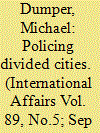

|
|
|
|
|
| Publication |
2013.
|
| Summary/Abstract |
The study of conflict in cities has emerged as a significant subfield in a number of disciplines. For policy-makers and analysts concerned with humanitarian interventions in cities emerging from conflict, the city as a form of human organization and its impact upon the establishment of security is of particular importance.
Less academic attention has been given to divided cities where the legitimacy of the state authority controlling the city is, itself, in question and where stabilization and the establishment of security is protracted. The adoption of integrative and inclusive approaches to policing becomes a key component in security regimes in divided cities. In these cases, however, to what extent should the stabilization phase be recast? Is the law enforcement phase subsumed and over-ridden by national security concerns?
This article examines these questions by suggesting a number of security models which have been used in a range of divided cities. It focuses in more detail on a study of Israeli policing in the Palestinian areas of East Jerusalem occupied by Israel after 1967 to draw some broader conclusions about the nature of the security regime in Jerusalem and other divided cities inside contested states.
|
|
|
|
|
|
|
|
|
|
|
|
|
|
|
|
| 9 |
ID:
123889


|
|
|
|
|
| Publication |
2013.
|
| Summary/Abstract |
Since the middle of the last decade the Russian leadership has conducted a strategic overhaul, publishing a cascade of new concepts, strategies and doctrines that attempt to frame plans in a long-term horizon to 2020 and beyond. Following Vladimir Putin's re-election in 2012, a series of presidential instructions and new plans have been published to update this overhaul.
This article examines this commitment to strategic planning and whether it is tantamount to a grand strategy. The article explores the various understandings of Russian strategy in the existing literature, before sketching a definition of grand strategy.
It suggests that Moscow has shaped a broad horizon and made some progress towards achieving the goals it has set out. But a grand strategy is more than formulating plans; it is also the coordination of relevant organizations and resources - 'conducting the orchestra' - to execute effectively the plans.
The article thus concludes by exploring the difficulties Moscow faces: on the one hand, an evolving and competitive international context and, on the other, a domestic context burdened by a heavy inheritance from the USSR and contemporary Russian problems. Taken all together, these suggest that although Moscow is committed to strategic planning, a grand strategy remains a work in progress.
|
|
|
|
|
|
|
|
|
|
|
|
|
|
|
|
| 10 |
ID:
123886


|
|
|
|
|
| Publication |
2013.
|
| Summary/Abstract |
During the Cold War, Nordic cooperation blossomed and the region's identity was strong, yet defence was left outside the Nordic framework. After the end of the Cold War, Nordic cooperation waned and it was largely replaced by cooperation within the framework of the European Union. During the past couple of years, however, Nordic defence cooperation has been boosted by a number of initiatives and common projects.
This article analyses this recent rise of Nordic defence cooperation. In terms of theory, it revolves around the question of how material and identity factors explain security cooperation in today's Europe.
During the Cold War, identity was an easy explanation for societal cooperation between the Nordic countries, but geostrategic factors and national interests based on them determined (the lack of) defence cooperation. Even today, Nordic defence cooperation is justified more by cost-efficiency and geographical proximity than by common identity.
This article argues that Nordic identity nevertheless plays an important role in motivating defence cooperation. It is not driven by pure cost-efficiency or strategic calculation. The role of identity needs to be understood, however, not as a kind of independent force but as part of the political process.
Nordic identity explains the rise of the region's defence cooperation in two ways: it facilitates informal cooperation between defence officials at various levels, and it is easy to sell international defence cooperation politically to domestic audiences if it is done in the Nordic context. Yet Nordic cooperation is not seen as contradicting European or NATO cooperation.
|
|
|
|
|
|
|
|
|
|
|
|
|
|
|
|
| 11 |
ID:
123881
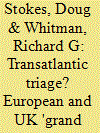

|
|
|
|
|
| Publication |
2013.
|
| Summary/Abstract |
Transition in the Middle East, the ongoing effects of the global financial crisis and the United States' rebalance to Asia are key trends that will have an impact on transatlantic relations and European defence. As US priorities shift, a common European 'grand strategy' could encourage the development of a shared vision to help Europe order its priorities and begin to respond to the new, post-austerity context of world politics and shrinking defence budgets.
Will these changes be enough to quicken Europe's currently shrivelled strategic thinking? In any scenario, given its relative weight and role as an interlocutor with the US, the United Kingdom will remain vital to any developing European security and strategy agenda, although its broader relations with the European Union will complicate this relationship. How it proceeds will also help to define the boundaries of this nascent European security order.
This article charts these key global trends, relates them to current debates in European security and strategy and maps opportunities and constraints faced by Europe and the UK in developing a grand strategy in an increasingly 'American-lite' European neighbourhood.
|
|
|
|
|
|
|
|
|
|
|
|
|
|
|
|
|
|
|
|
|